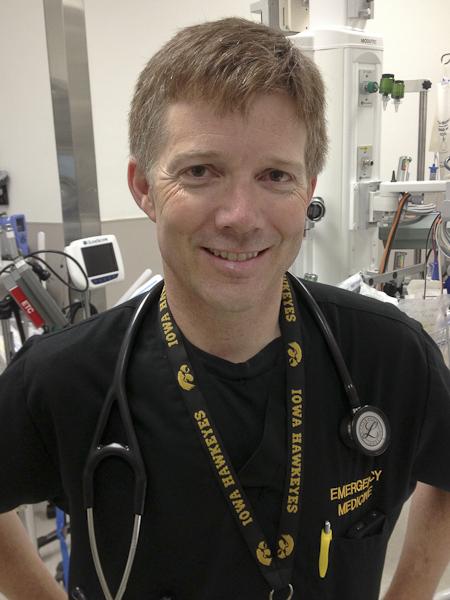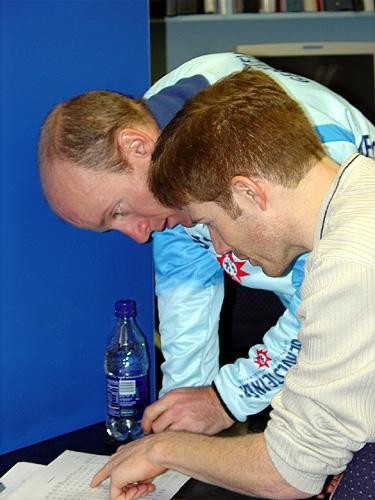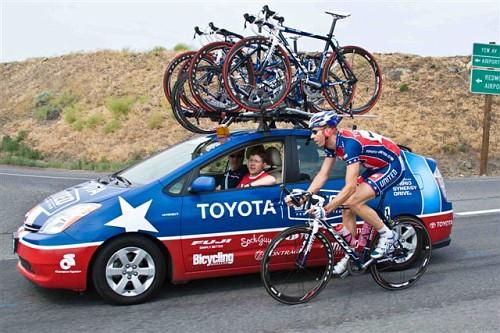Willett: There was an anti-doping community in the USA the nineties
Former pro explains his decision not to take EPO



Wednesday's revelations about which riders' samples tested positive for EPO at the 1998 Tour de France re-opened fresh wounds on the anti-doping front and prompted a familiar refrain about a "black period" in cycling and an unwritten acceptance that it was necessary to use performance enhancing drugs to compete.
Many of that generation's top riders were caught up in what happened, including many from the US. Their Australian peer Stuart O'Grady, who was implicated just days after he retired from the sport, told The Herald Sun he "was basically trying to survive in what was a very gray area". Reacting to the revealing of the names of riders whose urine samples from the 1998 Tour de France revealed traces of EPO, Lance Armstrong told Cyclingnews that the nineties was "an unfortunate era for all of us and virtually all of us broke the rules, and lied about it."
But former US pro rider and team director Kirk Willett, 43, an early anti-doping advocate who raced for the US national team in the mid-90s alongside several of the riders who have since been caught or admitted to using performance enhancing drugs, has told Cyclingnews recently that there was never any ambiguity in the USA at the time about the right-and-wrong of taking banned substances.
"Perhaps in Europe that's all you knew back then, so you never knew a different choice, but I think for the most part riders in the US knew there was a choice," Willett said recently while taking a break from his duties as an emergency room physician at the University of Iowa Hospital in Iowa City.
"There was a strong anti-doping community in the US throughout the mid-90s," Willett said. "There was no confusion that doping was something that you were supposed to avoid. It was against the rules, unethical. We all understood that. It was very clear. I can't speak for the young up-and-coming European riders, what their experience was, but I know for the North Americans, and the US in particular, there was no misunderstanding."
Willett began his cycling career in the Pacific Northwest in 1984 at the age of 14, gradually moving through the ranks to compete professionally and ride for the US national team. He raced professionally in the US and in Europe as part of the Mercury, Colorado Cyclist, Nutra Fig and Prime Alliance teams. He was the team director at Prime Alliance from 2000-2003 and led Toyota-United for one season in 2007.
During his own career, Willett achieved more than 100 national and international victories. He competed in UCI ProTour events such as the Tour of Switzerland and garnered stage wins at the Tour of Venezuela and Tour of El Salvador. He enjoyed yellow jersey wins at Visalia/Exeter, the Tour le Fleur, the Tour of Willamette and the B.C. Commonwealth Invitational.
The latest race content, interviews, features, reviews and expert buying guides, direct to your inbox!
Willett's personal experience with the PED temptation that overcame so many of his fellow riders took place when he was on the national team in 1994-95. He had already heard through word of mouth about riders using boosters and about the programs that existed on bigger teams, and he had witnessed for himself the miraculous power among his competitors. But there came a point when he simply decided he would never use PEDs.
"I wrote it down on a piece of paper, and that was my line in the sand," he said. "EPO was becoming super prevalent and basically making it a whole other world. But we all knew that, and that's kind of where people stepped off the train or decided to go that route because they couldn't bear the idea of investing all those years just to get to that dead end.
"It was difficult for me to see and hear about how it can transform you," Willett said of EPO. "But at the same time, what are you going to get in the end? Are you going to buy a better house, a car? What is the real price you're going to pay if you were someone who really valued being true and whatnot? So there is a price there. I'm sure there were plenty of guys who really had to swallow hard to make the choice to do it, but I'm sure it got easier after that."
Willett "stepped off the train" and competed domestically in the US alongside teammates that included future WorldTour riders Floyd Landis, Levi Leipheimer, Chris Horner, Baden Cooke and Will Frishkorn, among others. At Prime Alliance he directed the Carney brothers Jonas and Jamey, Micheal Creed, Danny Pate, Svein Tuft and Jonathan Vaughters for a season after he returned from European racing.
After the 2003 season, Willett left cycling to pursue his undergraduate degree and the medical ambitions he had harbored since high school. He joined Toyota-United in 2007 as director for one season in the months between finishing his undergraduate work and starting medical school.
Compete Clean
Even when he was out of cycling, Willett's thoughts were never far away from the sport he'd learned to love over his 20-year career of racing and directing. In 2005 he started the "Compete Clean" organization - an early precursor to current groups like Ride Clean and Bike Pure - to advocate for clean sports.
"My brother and I kind of came to the point where we wanted to see if we could try and do something," Willett said. "We wanted to have a way of promoting clean sport by being a little more vocal about it in some way and trying to have a positive voice."
Willett and his brother enlisted the aid of longtime friend Prenctice Steffen, a former US Postal team doctor who was allegedly dismissed by the team following the 1996 season after telling management he had been approached by riders seeking information about PEDs. Steffen was working with Vaughters' fledgling TIAA-CREF team during the time the Willett brothers were trying to build momentum behind Compete Clean.
But the US cycling scene at the time was in the thrall of Lance Armstrong's record-breaking string of Tour de France wins, and talking about prevalent PED use at the top of the sport was not a high priority for most people.
"[Steffen] got a bunch of stickers and we tried to get them on the guys' bikes and get them out there," Willett said. "I'm not sure how long they lasted on the bikes, but we were trying."
And Willett is still at it. Even after having had two children with his wife, Tina, graduating from medical school and having less than a year remaining in the University of Iowa's Emergency Medicine program, the 43-year-old physician is trying to help heal the sport.
Willett has engaged his old teammate, Vaughters, several times in public debates on Twitter about the course cycling should take in the wake of ongoing PED revelations. They've respectfully disagreed on the lingering benefits of prolonged PED use, the number of riders who lost opportunities because of their doping cohorts, and about what kind of penalties the busted or admitted dopers should face and what their roles should be in cycling's future.
As expected, Willett has some strong views on all of the subjects, especially the notion that cycling and the anti-doping agencies involved have not provided a proper level of deterrence.
"Right now, the science is going full speed on trying to improve the testing, and there's been some recognition amongst the professional cycling community that we have to address this problem," Willett said. "But the weak link is the penalty aspect."
Willett believes the sport has still not reached the point where the risks outweigh the potential benefits of PED use.
"If you look at how the sport has handled doping since the beginning - and then with all the oxygen-delivery enhancing substances that became much more available - no one really took it seriously," he said. "So you have this kind of self-reinforcing process where people will get caught, whether it's through police action or positive tests, and they don't really end up paying a price. Some people will get three months and pay a fine, or they'll get two years, and then they all get hired back.
"And so the message for 20 years has been, you know what, it's OK if you get caught because someone is going to give you a job," Willett said. "You may not get paid, at least officially, for the time you were gone, but you're really not going to pay a big price. There are exceptions, but in general that's been the approach."
Although high-profile firings such as Julich from Team Sky before the season started - and more recently Jeroen Blijlevens at Belkin - are hints at a change in philosophy, decades of rampant PED use and a process of selection that favored those who were willing to bend the rules have led to a skewed ethical scale in cycling, Willett said.
"At some point we all get to the point where there's a decision to be made, and we all lie on different spots in the ethical spectrum, so everyone decides what they're willing to do. But if there is no true risk - other than having to lose some face to folks - the ethical spectrum basically moves. If we were to have some real accountability tools, then all of the sudden you're going to improve the whole spectrum," Willett said.
Reasons for hope
Improved testing and a changing culture have made significant ground in cleaning up the sport since his own generation was competing, Willett said, but a lack of serious changes in the penalties doled out are the missing piece of the full package. He said the selection process that took place at the top of cycling over the past decades makes the penalty component of change the toughest to overcome.
"The sport is in a difficult position to go about that, because a lot of folks who are in positions of influence have friends who were involved in it or were involved in it themselves," Willett said. "And I think it's difficult to really start cracking down in this period because you have these personal interests at stake as well."
That's one of the reasons Willett sees law enforcement as key component in cleaning up sport. He said judicial efforts in France and with Spain's Opercion Puerto went a long way toward not only spotlighting the level of cheating, but also sending a heavy message of deterrence.
Despite his view that cycling has a lot of work ahead before it can guarantee clean cyclists will be able to compete fairly, Willett also remains hopeful that it can eventually reach that point with continuously improved testing, a reformed culture and a higher level of deterrent.
"As long as we realize it takes a constant effort to try and refine things, to improve the disciplinary tools and keep pushing the culture, it's going to make it even better," he said. "My sense is you can look back even five years ago, and the sport has made a lot of progress. There were a couple of years where I was like, 'Oh my Gosh, I don't know if I can watch the Tour anymore.'
"I think what's really encouraging to me is that over the next five years, when the new generation comes into the spotlight and establishes itself as the day-in and day-out folks in the peloton, I think we're going to have a better sense that these guys really belong there," he said.
And Willett is also buoyed by recent performances from riders of his own generation. Stories of Pate almost winning a stage in the Tour a couple of years ago, and Tuft playing a huge role in his team's success this year, give Willett hope. Both riders managed to keep their reputations intact when so many of their generation succumbed to temptation. Now, in a cleaner environment, they are back at the top of their sports.
"Those are guys who went through the depths of that whole era and have come out to establish themselves as key players in the WorldTour," Willett said. "I think that's encouraging. Too bad there are so few of them, just because of that whole selection process that was in play."
Growing up in Missoula, Montana, Pat competed in his first bike race in 1985 at Flathead Lake. He studied English and journalism at the University of Oregon and has covered North American cycling extensively since 2009, as well as racing and teams in Europe and South America. Pat currently lives in the US outside of Portland, Oregon, with his imaginary dog Rusty.